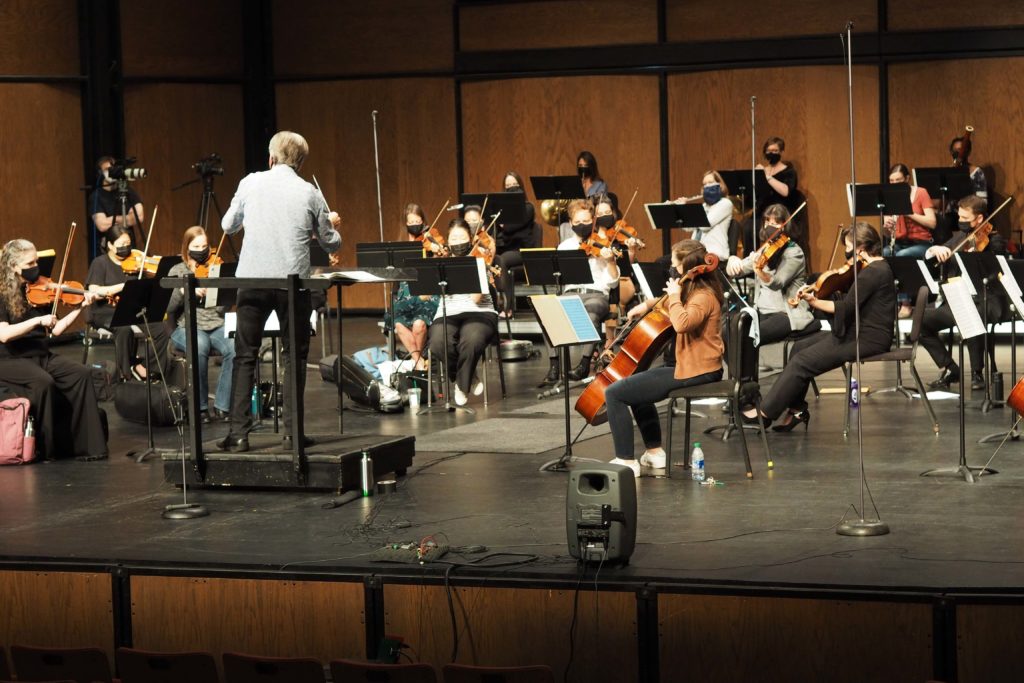
This weekend Nashville’s Gateway Chamber Orchestra will release a new work by a local composer. The recording will be one of the first, large orchestral pieces to be released as a non-fungible token, or NFT. The piece – called Prelude – could mark the introduction of a new way for composers to control their work.
The piece has a cinematic quality to it, with a driving beat from the timpani. The melody hearkens the start of a journey, which composer Cristina Spinei says was intentional.
“I even titled it Prelude because I see it as the beginning of something new,” she says. “This is the first time that a new piece for orchestra is being released on the blockchain.”
It may seem confusing and futuristic, but an NFT is basically a digital file that lives online and is usually purchased with cryptocurrency. The five-minute audio file, a video recording and the score will be available on the platform OpenSea.
Spinei says there are a lot of benefits to releasing music this way.
“The thing that attracted me to NFTs and this crypto-art is artists receive royalties on the secondary sale market of their work,” she says. “You have complete control over what you release, when you release it, how you release it.”
Prelude will be sold to 20 buyers, but if those buyers want to sell the song to others, Spinei still gets money from the sale. She says that makes for a more equitable distribution of the profit.
“There’s no label taking a percentage of the profit,” she says. “It’s just you and then whatever you decide to split up with the musicians too.”
Spinei came up with the idea for Prelude after her husband sold some visual art as a NFT. She decided to approach Middle Tennessee’s Gateway Chamber orchestra with the idea.
“It’s not easy to get an orchestra to agree to anything,” she says. “You have so many people, so many different opinions, so many personalities. And especially something as out of the box as this.”
Selling musicians on the idea
At first, the director and conductor of the Gateway Chamber Orchestra, Gregory Wolynec, says he was a bit lost.
“When I see letters like NFT, and when NFT is defined by using a word like ‘blockchain’ … I find myself feeling maybe in over my head,” he says, laughing.
Once he — sort of — got his mind wrapped around the idea, he had to pitch it to the musicians.
 Courtesy of Stephanie Elder, Gateway Chamber Orchestra
Courtesy of Stephanie Elder, Gateway Chamber Orchestra Cellist Michael Samis with Gateway Chamber Orchestra concertmaster Emily Hanna Crane during rehearsal.
“When musicians within the orchestra want to applaud each other and let them know well done, we don’t actually clap,” he says. “We just shuffle our feet on the floor. That’s the tradition within orchestras. So I was just suddenly aware that everyone was shuffling their feet, so that meant, ‘We approve!'”
Unlike usual recording sessions, the composer and the musicians that played on Prelude agreed to split the royalties 50/50.
While the idea was out of the box, Wolynec felt he owed it the musicians to try something new in the wake of the pandemic. The piece will be part of a virtual concert series called America’s Haydn Festival.
“What have we got to lose?” he says. “If this is something that is going to be able to provide a very new model for composers, and performers, and we don’t try to take advantage of it, particularly at this time in the history of our planet? I think that would be a mistake.”
While classical music may have a reputation for being old-school, Prelude may mark a new frontier for orchestras on the blockchain.

